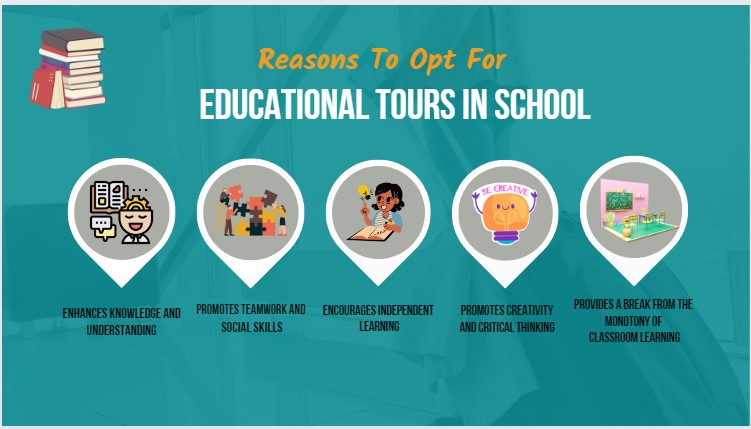Summer vacation, while important for relaxation, can also be a chance for students to learn in new ways through educational trips. These planned visits help students explore ideas beyond textbooks. By seeing how what they learn in class applies in the real world, students gain practical knowledge that lectures alone cannot provide. This learning-by-doing approach strengthens the connection between theory and experience, making education more meaningful. Educational trips also help students grow as individuals. By navigating new places and interacting with different cultures, students develop independence, adaptability, and critical thinking skills. In short, these summer vacation trips are valuable for students’ overall development. The importance of educational tours is that it prepares them for the future with both academic knowledge and essential life skills.
Must Read: My plans for summer vacation
Importance of Educational Tours for Students in Summer Vacations

Educational tours are more than just field trips; they are transformative experiences that enrich students’ learning in profound ways. These excursions provide a dynamic extension to classroom education by offering firsthand encounters with historical sites, scientific phenomena, cultural traditions, and natural wonders. Beyond textbooks and lectures, educational tours immerse students in real-world contexts, fostering deeper understanding, sparking curiosity, and igniting a passion for learning. By stepping outside the confines of the school walls, students not only broaden their knowledge but also develop crucial life skills such as independence, adaptability, and teamwork. In this era of immersive and experiential learning, educational tours stand as invaluable opportunities for schools to enhance their educational offerings and empower students with practical insights that resonate far beyond the classroom. Some of the benefits are:
Improves knowledge and comprehension
- One of the primary benefits of educational tours is their ability to enhance students’ knowledge and deepen their comprehension of various subjects.
- Visiting historical sites, museums, or scientific institutions allows students to witness firsthand what they’ve learned in textbooks.
- For instance, walking through the ruins of ancient civilizations can make history come alive, making it more memorable and understandable than reading about it in a classroom.
Cultural Enrichment
- Encountering diverse cultures and traditions expands students’ outlooks and nurtures cultural awareness.
- Educational trips often include visits to places of cultural significance, where students can engage with local customs, art, cuisine, and language.
- This exposure not only promotes tolerance and respect but also encourages students to appreciate diversity, which is increasingly important in our globalized world.
Personal Growth
- Travelling, especially with peers and teachers, promotes personal growth by encouraging students to step out of their comfort zones.
- Navigating new environments, interacting with strangers, and managing responsibilities away from home build confidence and independence.
- These experiences help students develop essential life skills such as problem-solving, adaptability, and resilience, which are valuable beyond academic settings.
Career Exploration
- Educational tours provide invaluable opportunities for career exploration by exposing students to various industries, professions, and workplaces.
- Visits to businesses, research institutions, or vocational training centers give students insights into potential career paths they may not have considered.
- This hands-on exposure can inspire career aspirations and help students make more informed decisions about their future academic and professional pursuits.
Social Bonding
- Shared experiences during educational trips strengthen bonds between students and between students and teachers.
- Collaborative activities, group discussions, and shared challenges promote teamwork and friendship.
- These bonds contribute to a positive classroom environment back at school, where improved relationships among peers and with teachers can improve overall academic performance.
Motivation and Engagement
- Educational tours can reignite students’ passion for learning by presenting subjects in a new light.
- The excitement of exploring new places and discovering new ideas can boost motivation and engagement, making learning more enjoyable and meaningful.
- This renewed enthusiasm often translates into improved academic performance as students return to their studies with fresh perspectives and increased curiosity.
Practical Skills Development
- Travelling requires students to navigate unfamiliar environments, manage resources, and solve problems in real-time.
- These practical challenges develop critical thinking, decision-making, and organizational skills.
- Whether it’s planning a journey, budgeting expenses, or communicating in a foreign language, students acquire skills that are essential for success in both academic and professional life.
Enhanced Academic Performance
- The knowledge gained from educational tours complements classroom learning and can significantly enhance academic performance.
- Students often exhibit improved retention of information and a deeper understanding of subjects that have been reinforced through experiential learning. This can result in improved grades and academic success across a range of subjects.
Things to Keep in Mind When Planning for an Educational Tour
- When planning for an educational tour, several key considerations can ensure a successful and enriching experience for students. Firstly, defining the educational objectives and desired learning outcomes is crucial.
- Whether it’s exploring historical landmarks, studying ecosystems, or immersing in cultural exchanges, clarity on educational goals guides the itinerary and activities.
- Logistics such as transportation, accommodations, and safety measures must be meticulously planned to ensure smooth operations throughout the trip.
- Additionally, selecting knowledgeable guides or experts who can provide insights relevant to the tour’s theme enhances the educational value.
- Budgeting for expenses, including entrance fees and meals, is essential to avoid any financial surprises. Moreover, considering the diversity of students’ backgrounds and needs ensures inclusivity and accessibility during the tour.
Reasons to Opt for Educational Tours in School
Educational tours offer numerous compelling reasons for schools to integrate them into their curriculum. Those reasons are:
- Firstly, these tours provide students with hands-on learning experiences that complement and reinforce classroom teaching. By visiting historical sites, scientific institutions, or cultural landmarks, students can witness concepts come to life in real-world contexts, enhancing their understanding and retention of academic material.
- Secondly, educational tours promote personal growth by encouraging students to step out of their comfort zones, fostering independence, adaptability, and problem-solving skills as they navigate unfamiliar environments.
- Additionally, these experiences cultivate cultural awareness and sensitivity by exposing students to diverse cultures, traditions, and perspectives, promoting empathy and global citizenship.
- Furthermore, educational tours spark curiosity and ignite passion for learning, as they often introduce students to new interests and career possibilities through interactive and engaging activities.
Conclusion
Educational tours during summer vacations are more than just a break from routine; they are powerful educational tools that enrich students’ lives in numerous ways. These experiences not only expand students’ knowledge beyond textbooks but also foster cultural awareness by exposing them to different customs, languages, and traditions. Moreover, educational tours promote personal growth by encouraging independence and resilience as students navigate new environments and challenges. They also serve as pivotal moments for career exploration, offering insights into various fields and industries that can ignite passion and direction for future pursuits. At Heritage Girls School, we believe in cultivating these transformative opportunities to empower students academically, personally, and professionally.
Frequently Asked Questions
1. Can educational tours be integrated into the curriculum?
Yes, many schools incorporate educational tours as part of their curriculum to enhance learning outcomes and meet educational standards.
2. How can parents support their child’s participation in educational tours?
Parents can support their child’s participation by staying informed about the trip details, ensuring necessary permissions and paperwork are completed on time, and discussing the educational benefits of the trip with their child.
3. How do educational tours contribute to a student’s overall academic success?
Educational tours contribute to academic success by reinforcing classroom learning through experiential education. They enhance students’ understanding of concepts, improve retention of information, and inspire curiosity, all of which are conducive to academic achievement.
4. What skills do students develop during educational tours?
Students develop a range of skills during educational tours, including critical thinking, problem-solving, communication, teamwork, adaptability, and cultural sensitivity. These skills are valuable for academic success and personal growth.


